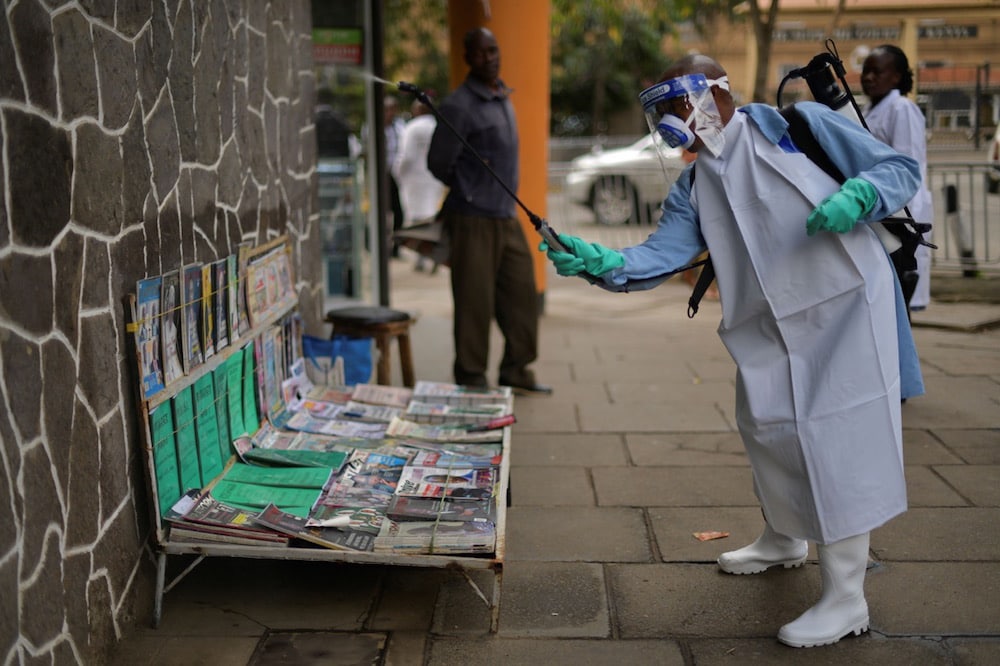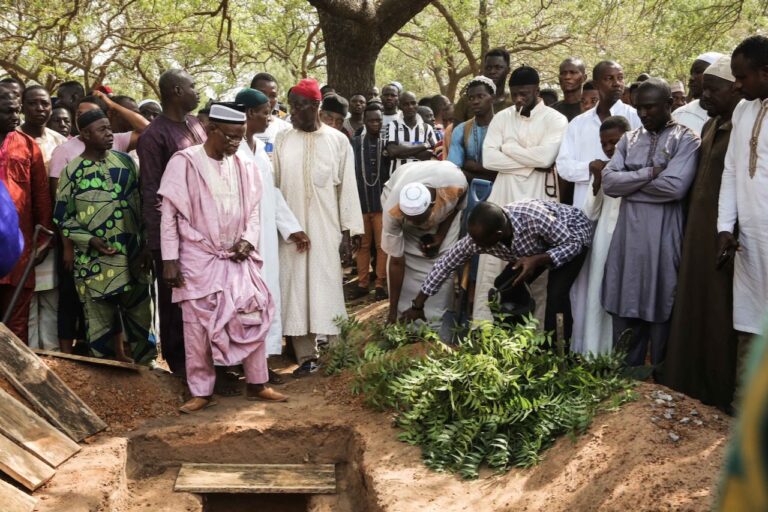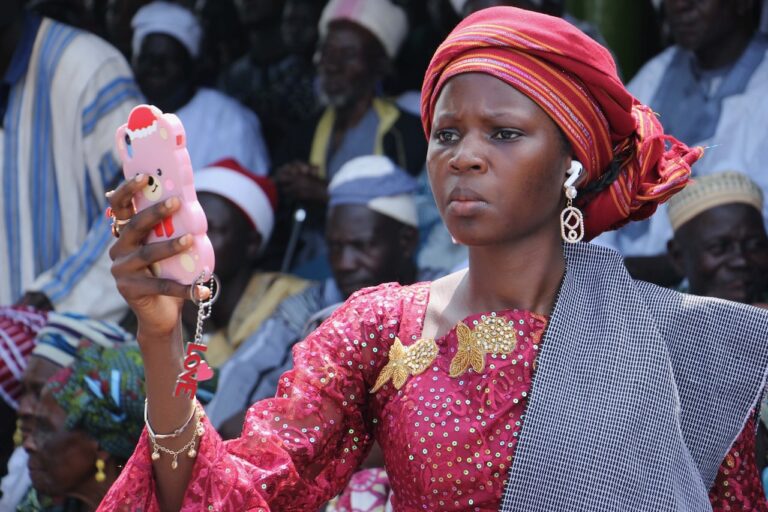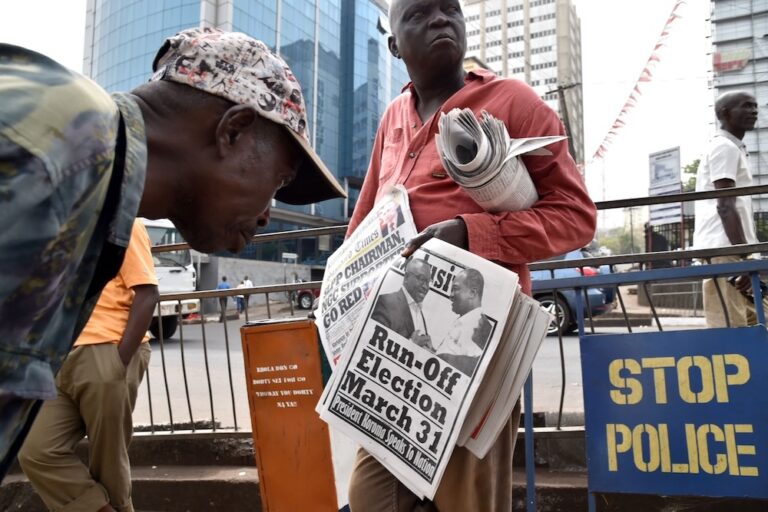The global pandemic has brought the critical issues of brutality, repression, sustainability and independence of media outlets and information on the African continent to the surface.
This statement was originally published on rsf.org on 27 November 2020.
In partnership with Cartooning for Peace, Reporters Without Borders (RSF) presents a summary of infringements of press freedom in Africa arising from the coronavirus epidemic. RSF calls on the continent’s governments to learn the lessons of the 2020 health crisis, which has seen growing brutality towards journalists, media outlets struggling financially, a lack of transparency and repressive legislation, and to refrain from further undermining the production of independent news and information which has been sorely tested on the continent.
Sharp rise in abuses
On 24 March, Tholi Totali Glody, a journalist with the Alfajiri TV, a flagship TV station in Haut-Katanga province in the Democratic Republic of Congo (DRC), was chased by the police and knocked off his motorcycle after explaining that he was reporting on compliance with the lockdown imposed by the provincial governor. He ended up in hospital with a broken leg in plaster.
A few days later in South Africa, Azarrah Karrim, a News24 reporter, was filming compliance with the lockdown when she came under fire from rubber bullets fired by the police. When she complained, police officers joked: “They missed you? What a waste!”
When not being physically attacked as they cover the epidemic, journalists are often arrested. Kufre Carter, a journalist with the local radio station XL 106.9 FM in south-western Nigeria, was arrested on 27 April by the State Security Service, a unit responsible for domestic security and counter-terrorism. He was accused of conspiracy and defamation and spent a month in custody for criticizing the local authorities’ handling of the health crisis.
At the time of writing, Dieudonné Niyonsenga, who runs the Rwandan YouTube news channel Ishema TV, remains the only African journalist in prison for violating the country’s COVID-19 lockdown regulations. At the time of his arrest he was reporting on the effects of the lockdown on the population and investigating allegations of rape committed by soldiers enforcing the lockdown.
Some were forced to flee to escape the worst. Eugene Dube, editor of the Swati Newsweek website, fled Eswatini (formerly Swaziland) after questioning the authorities’ handling of the epidemic. In Africa’s last absolute monarchy, any criticism of King Mswati may be treated as “high treason”, punishable by the death penalty.
Paul Nthoba, editor of the South African community newspaper Mohokare News, fled to Lesotho after he was threatened and assaulted by police during a lockdown enforcement operation. It was the first time in post-apartheid South Africa that a journalist had been forced to flee abroad as a result of his work.
At the height of the crisis between 15 March and 15 May, three times as many journalists were assaulted (23) and arbitrarily arrested (31) in sub-Saharan Africa compared with the same period in 2019, according to RSF’s #Tracker_19 tool for monitoring and evaluating the impact of the coronavirus pandemic on journalism. It recorded 109 infringements of press freedom on the continent since the start of the health crisis. Of the 48 countries in sub-Saharan Africa, 29 have seen at least one breach of freedom of news and information on the subject. However, Nigeria (15 cases), Zimbabwe (14) and Uganda (12) together account for 38 per cent of the registered violations.
Press freedom violations documented by RSF in 2020:
“This thorough report is a telling sign of the great hostility and mistrust towards African journalists and media outlets, which are too often regarded as enemies rather than allies in the fight against the coronavirus,” said Arnaud Froger, the head of RSF’s Africa desk.
“In response to uncertainty and the unknown, many governments have chosen strong-arm tactics, preferring the bludgeon to the pen, and censorship to investigating the truth of the epidemic. Crackdowns, the withholding of information and the criminalization of journalism are inadequate responses to the tremendous challenges facing us in this epidemic.
“We call on the countries of the continent to draw the lessons from this year’s health crisis, including the increasingly indispensable role played by journalists in providing access to reliable and high-quality news and information, by guaranteeing them greater freedom, protection, financial support and broad and transparent access to public data.”
Censorship and news blackout
In some countries the health crisis has aggravated the severe threats and pressures that already weighed on journalists before the epidemic. Since 2016 Tanzania, whose president John Magufuli has just been re-elected for a second term, has fallen 53 places in the World Press Freedom Index (to 124 of 180 countries). In April the president decided to stop publishing details about the infection in the country while referring in his speeches to a “Western plot”.
In the worsening climate, in which self-censorship became the rule in order to avoid trouble, the news blackout made coverage of the epidemic and its effects almost impossible for Tanzanian journalists, as RSF pointed out in a report a few weeks ago.
Several news outlets, including the country’s leading Swahili-language newspaper Mwananchi, were closed down after publishing stories about Covid-19. Others were forced to broadcast apologies after carrying reports on the subject which angered the authorities.
In countries where independent news and information is closely monitored or banned altogether, coronavirus has been subjected to censorship. The government of the world’s longest serving leader, Teodoro Obiang, president of Equatorial Guinea for the past 40 years, suspended “Buenos días Guinea” (Good morning Guinea), a popular Spanish-language programme broadcast by the country’s only commercial station Asonga TV which is owned by the president’s brother. The programme’s seven journalists were laid off after it aired a report on violence carried out by soldiers enforcing the lockdown.



